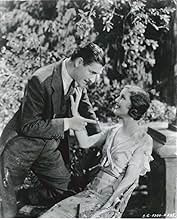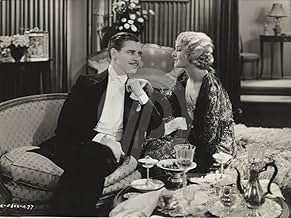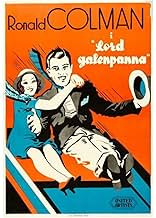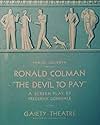Adicionar um enredo no seu idiomaSpendthrift Willie Leyland again returns to the family home in London penniless. His father is none too pleased but Willie smooth-talks him into letting him stay. At the same time, he turns ... Ler tudoSpendthrift Willie Leyland again returns to the family home in London penniless. His father is none too pleased but Willie smooth-talks him into letting him stay. At the same time, he turns the charm on Dorothy Hope, whose father is big in linoleum and who, before Willie's arriva... Ler tudoSpendthrift Willie Leyland again returns to the family home in London penniless. His father is none too pleased but Willie smooth-talks him into letting him stay. At the same time, he turns the charm on Dorothy Hope, whose father is big in linoleum and who, before Willie's arrival, was about to become engaged to a Russian aristocrat.
- Direção
- Roteiristas
- Artistas
- Prêmios
- 2 vitórias e 1 indicação no total
- Arthur
- (as Crawford Kent)
- Bidder for Bed
- (não creditado)
- Molly - Mary Crayle's Maid
- (não creditado)
- Racing Fan at Derby
- (não creditado)
- Mrs. Hope
- (não creditado)
- Taxi Driver
- (não creditado)
- Pet Shop Owner
- (não creditado)
- Club Member
- (não creditado)
- Butler
- (não creditado)
- Lord Leland's Butler
- (não creditado)
- Porter
- (não creditado)
Avaliações em destaque
Essentially this film is just an excuse for Ronald Colman just to do what Ronald Colman does: be charming, suave, witty and nonchalantly amusing. That basically it and you'll wonder if a whole picture can be nothing more than Ronald Colman doing Ronald Colman...surely he can't pull that off for a whole hour and a half - but he does!
In comparison with the dross which comprised the majority of what was being churned out in 1931, this is such a refreshing exception. Watching this, you can understand why Sam Goldwyn, all these years later, is still remembered as one of Hollywood's greatest producers. He made sure everything was perfect, he knew exactly how to entertain an audience, he knew how to make pictures. What's also refreshing is that this is a comedy about the super-rich, the English aristocracy in fact and yet the characters are normal, they're believable and kind of real. They're neither the bloated, pompous stuffed shirts or the cold, emotionless, evil and callous caricatures which they're normally portrayed as - they're just real people acting normally.
It's not just the star who shines in this. Besides the outrageously likeable Mr Colman, we've got a cute dog, we've got Myrna Loy being a blonde bombshell with an English accent, we've got loveable old grump Frederick Kerr (of Frankenstein and numerous Jessie Matthews comedies) not to mention Loretta Young. No, why would we not want to mention Loretta Young? She's remarkable in this - not only is she impossibly pretty (if this were made now, you'd think she had to be CGI generated because it's hard to believe that anyone can look so absolutely perfect) but she acts as though she's being doing talkies for decades. The big, big, big question you will ask yourself when watching this is: if this whole crew can act so well, so convincing and naturally why, oh why is the acting in most 1931 films was so truly awful!
This is not a hidden gem or anything like that but it's pleasant and amusing. What this guarantees and importantly it does it without being at all slushy and sentimental in any way (again refreshing for a 1931 film), is a cheerful and warm hug. The script is still actually quite funny today which I think is because it doesn't resort to being stupid or slapstick so it can still raise a smile from a modern audience. As fluffy lightweight romantic comedies go, this is one of the best.
But, the main character of the film, around whom the whole plot revolves, is the more well-known actor at the time, Ronald Colman. His career too began in the silent films. He was 26 when he made his first film in 1917, and he was a popular star by 1930. He had 30 films to his credit, some of which were silent classics. Colman was 22 years older than Young when this film was made - his 39 to her 17. But, besides being a standout talent already in her teens, Loretta Young was a girl who looked much more mature and older than her age - but just the right number of years.
While this is a good comedy, it has a feel of being somewhat disjointed. There are no apparent holes in the plot, but there's no stream that holds together the earliest scene of Willie Hale's (Colman) disposition of his property and goods in South Africa, and then his appearance back home after an absence of two years. Colman gives a nonchalant treatment to his character that is a trademark in his comedies. But, in this case, his wistfulness with his father, Lord Leland (played by Frederick Kerr) is so pronounced that it's hard to take him at all seriously. So, did he fear his father's reaction and treatment, or was that just nonsense?
The story has a nice ending - a type that should be familiar to fans of old black and white movies. There isn't any great acting in here, but Colman's presence is commanding in his scenes. That's most often because one is waiting for and expecting the next bit of comedy or witticism to come from him. Indeed, without the comedy in the dialog, this film wouldn't be much worth watching.
Fans of Colman, Young and Loy should enjoy this film, and others who like the older movies may be entertained by it. But modern audiences would probably struggle to sit through this film. Here are some favorite lines.
Willie Hale, to his father, Lord Leland, "Oh, come now. How could anything I do disgrace you?... Anything disgraceful that I may do merely gains for you an unfair sympathy from a sycophantic world."
Lord Leland, "Now...now you're blaming me for bringing you into the world!" Willie Hale, "Heh, heh, I should be extremely mortified for your sake if I had to blame anyone else."
Willie Hale, "Have you had a moment's boredom since I've been in the wrong? No! Your only trouble is, you have the father complex - 'Here's my son and he hasn't done any of the things I should like him to do and for that reason I should kick him out.'"
Mary, "I'd shoot anyone who tried to take you from me, Willie." Willie, "Are you a good shot?"
Lord Leland, "Well, then, what do you want to go to New Zealand for?" Willie Hale, "Because, if I ever want to go to Australia, I'll be near."
Coleman plays Willie Hale, a 30ish playboy from a wealthy family who spends his time womanizing and gambling. Yet, he's a likable rogue - not only likable from the standpoint of the audience but by family and friends too. He has yet again gone broke due to his constant gambling and sells off his possessions in a foreign location to settle his debts and provide passage back home to England. When he gets there, he at first is met by a father who insists he'll kick him out - he's had it with Willie and his layabout ways. However, five minutes alone in a room with Willie and his charm, and Willie is not only forgiven by dad, dad has given him one hundred pounds to boot.
Willie then goes for a day's recreation with his sister and her friend, Dorothy Hope (Loretta Young). Dorothy is set to be engaged to the Grand Duke Paul that very night, mainly just because her dad wants royalty in the family, and there is nobody else special in her life. That changes after her day with Willie, and soon there is a scandal brewing as Dorothy refuses to go through with the marriage as planned.
Ronald Coleman is always a delight to watch in these early talking films he did for Sam Goldwyn where he is playing the confident adventurer or cad or both. He has a demeanor akin to Errol Flynn, but he is unable to display Flynn's physical agility due to a disabling wound he received during World War I. However, what he lacks in physical agility Coleman always made up in agility of soul. Loretta Young, only 17 when this picture was made, shows the beginning of her trademark sweet girl that can erupt into a ball of fire when the occasion calls for it. Myrna Loy plays Willie's girl from the past - Mary Crayle - a showgirl. Here Myrna is still playing a part similar to the exotic vamp parts she got stuck with so often over at Warner Brothers when she was a contract player from 1926 until shortly before this movie was made in 1930.
This is pretty much a light and breezy romantic comedy from start to finish. If you're in a mood for the kind of escapist entertainment that lightened the hearts of audiences during the Great Depression, this little film fits the bill.
At this point, there are two women in his life--showgirl Myrna Loy and rich girl Loretta Young (who is already engaged). How will all this work out and will Ronald wise up and act like a responsible adult--these are the main themes of this pleasant little film.
This isn't a great movie and certainly won't change your life, but it certainly is very entertaining and fun. Most of this is due to the always genial acting of Ronald Colman. Heck, in the heyday of his career in the 1930s, he could have played in REEFER MADNESS or some other dreck and still made it entertaining and likable due to his charming persona. His seemingly effortless style in this movie make it very easy to like him and it's easy to see why both Loretta Young and Myrna Loy are in love with him in the film! Plus, the writing is very witty and make this a nice romantic-comedy.
Você sabia?
- CuriosidadesThe film's original director was Irving Cummings with Dorothy being played by Constance Cummings. After some scenes were shot, George Fitzmaurice replaced Cummings as director, and Loretta Young took over the role of Dorothy, with all previous scenes re-shot.
- Erros de gravaçãoBoom microphone shadow is unmistakable in a number of interior scenes toward the beginning of the film.
- Citações
Lord Leland: Here it is half-past nine and not a sign of him.
Dorothy Hope: Have you called the police?
Lord Leland: Do you know Master Willie?
Dorothy Hope: No, I've never met him.
Lord Leland: Well, if you had, you'd know telephoning a policeman's wife would be more effective.
- ConexõesReferenced in Presa do Destino (1933)
Principais escolhas
- How long is The Devil to Pay!?Fornecido pela Alexa
Detalhes
- Data de lançamento
- País de origem
- Idioma
- Também conhecido como
- The Devil to Pay!
- Locações de filme
- Empresa de produção
- Consulte mais créditos da empresa na IMDbPro
- Tempo de duração1 hora 12 minutos
- Cor
- Mixagem de som
Contribua para esta página



































